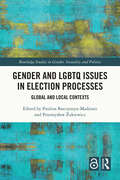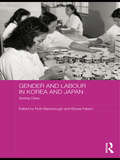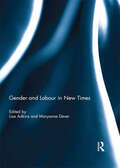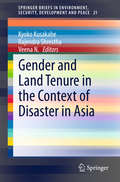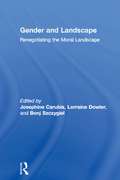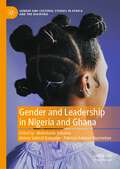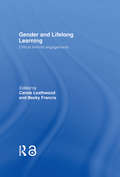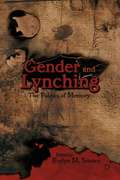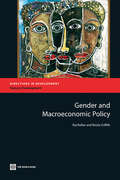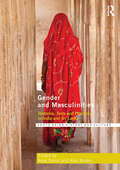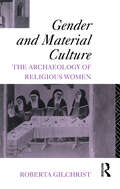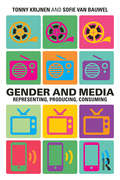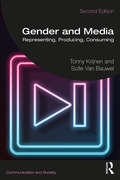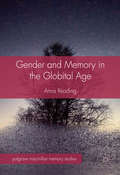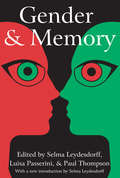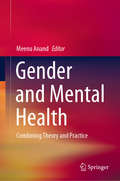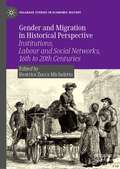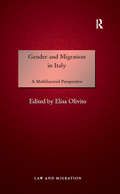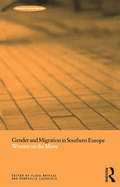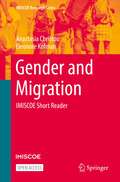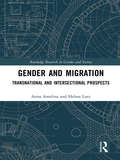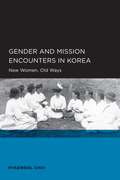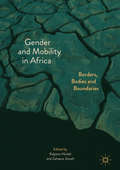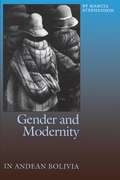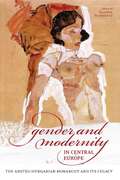- Table View
- List View
Gender and LGBTQ Issues in Election Processes: Global and Local Contexts (Routledge Studies in Gender, Sexuality and Politics)
by Paulina Barczyszyn-MadziarzThis book looks at issues on Gender and LGBTQ matters in political elections in both institutional and communication contexts. Examining wins and losses in elections and assessing accountabilities in those results this broad and international collection analyses how the issue of gender and LGBTQ identity is both factored into, and determines electoral success, not only in consolidated democracies such as the United States, New Zealand, and Norway, but also in a country facing an undemocratic turn such as Poland. . Does raising the subject of gender and LGBTQ issues affect electoral processes? Are there countries where gender and LGBTQ issues are more likely to be instrumentalised in the electoral process? Can common patterns between countries be detected? This book seeks to answer these questions and center gendered issues through a range of topics including party loyalty, voter participation, gendered media coverage, and discourses on electoral defeat, and leadership. This book is suitable for students and scholars in LGBTQ Studies, Politics, Social Sciences and Gender Studies.
Gender and Labour in Korea and Japan: Sexing Class (ASAA Women in Asia Series)
by Elyssa Faison Ruth BarracloughBringing together for the first time sexual and industrial labour as the means to understand gender, work and class in modern Japan and Korea, this book shows that a key feature of the industrialisation of these countries was the associated development of a modern sex labour industry. Tying industrial and sexual labour together, the book opens up a range of key questions: In what economy do we place the labour of the former "comfort women"? Why have sex workers not been part of the labour movements of Korea and Japan? Why is it difficult to be "working-class" and "feminine"? What sort of labour hierarchies operate in hostess clubs? How do financial crises translate into gender crises? This book explores how sexuality is inscribed in working-class identities and traces the ways in which sexual and labour relations have shaped the cultures of contemporary Japan and Korea. It addresses important historical episodes such as the Japanese colonial industrialisation of Korea, wartime labour mobilisation, women engaged in forced sex work for the Japanese army throughout the Asian continent, and issues of ethnicity and sex in the contemporary workplace. The case studies provide specific examples of the way gender and work have operated across a variety of contexts, including Korean shipyard unions, Japanese hostess clubs, and the autobiographical literature of Korean factory girls. Overall, this book provides a compelling account of the entanglement of sexual and industrial labour throughout the twentieth century, and shows clearly how ideas about gender have contributed in fundamental ways to conceptions of class and worker identities.
Gender and Labour in New Times
by Lisa Adkins and Maryanne DeverThis book is concerned with the gender order of post-Fordism, and especially the labour demanded from many women by post-Fordist capitalism. It maps and traces these demands as well their entanglement in complex processes of value creation. In so doing the contributors elaborate how processes of financialization; calls for work-readiness; new modes of economic calculation; processes of economization, and emergent regulatory strategies are reconfiguring labour and life in post-Fordism and summoning new forms of ‘women’s work’. Contributors also map how these same processes are repositioning feminism, especially feminism as a mode of critique. Feminism here stands not in an external relation to the objects and matters it seeks to critique but as implicated in those very objects. In mapping this terrain Gender and Labour in New Times opens out new feminist research agendas for the study of the post-Fordist labour and the modes of regulation that post-Fordism as a regime of capital accumulation entails. This book was originally published as a special issue of Australian Feminist Studies.
Gender and Land Tenure in the Context of Disaster in Asia
by Kyoko Kusakabe Rajendra Shrestha Veena N.This book explores an interdisciplinary field at the intersection of gender and development studies, disaster and land tenure policy. It is well known that women generally have weaker claims to land. But how does that translate to increased vulnerability during disaster? Using case studies from Asia, this book argues that land tenure is a key factor in mitigating the impact of disasters on women. The scale and frequency of disasters have been increasing in recent decades due to human impact on the landscape and climate. Unsustainable farming and land management systems have increased environmental risks and social vulnerabilities. However, around the world the costs of disasters are disproportionately borne by women, due largely to their reduced mobility and lack of control over assets. In post-disaster settings, women's vulnerabilities increase due to gendered rescue and rehabilitation practices. As such, a gendered approach to land rights is critical to disaster preparedness and recovery.
Gender and Landscape: Renegotiating the Moral Landscape (Routledge International Studies of Women and Place #Vol. 6)
by Lorraine Dowler Josephine Carubia Bonj SzczygielGender and Landscape is a feminist inquiry into a long-ignored area of study: the landscape. Although there has been an exhaustive investigation into issues of gender as they intersect with space and place, very little has been written about the gendering of the landscape. This volume provides a bridge between feminist discussions of space and place as something 'lived' and landscape interpretations as something 'viewed'.
Gender and Leadership in Nigeria and Ghana (Gender and Cultural Studies in Africa and the Diaspora)
by Mobolanle Sotunsa Abiola Sakirat Kalejaiye Patricia Animah NyamekyeThis book provides balanced critical linguistic and literary representations of gender and power relations in Ghanaian and Nigerian texts, contrary to most existing literary and linguistic studies on gender that have either focused on male chauvinism or male emasculation. This text provides novel insight into gender dynamics, liberation and empowerment especially as it relates to language and power in Africa.
Gender and Lifelong Learning: Critical Feminist Engagements
by Becky Francis Carole LeathwoodThis insightful book is ideal for students, researchers and policy makers wanting a sound overview of the critical issues of gender in lifelong learning. Asking pertinent questions relating to discourses on policy, the authors offer the reader a rare view of lifelong learning from a gender-focused perspective, filling a gap in the literature and moving current debate on into new areas. Questions addressed include: To what extent can the policy discourses and institutional contexts of lifelong learning be seen as masculinised and/or feminised? What are the gender implications of lifelong learning policy? In what ways are learners’ identities constructed through lifelong learning? Does lifelong learning provide opportunities to challenge or transgress gender binaries? What are the implications for practice?
Gender and Lynching
by Evelyn M. SimienWhere much of the scholarship on lynching and its victims has focused on African American men, "Gender and Lynching" is the first to examine African American women in this history. The authorsprobe the reasons and circumstances surrounding the death and torture of African American female victims, employing such methodological approaches as comparative historical work, content and media analysis, and literary criticism.
Gender and Macroeconomic Policy
by Raj Nallari Breda GriffithMainstream economic analysis has traditionally overlooked gender. The individual-the basic category of analysis-was regarded as genderless. Neither gender discrimination nor segmentation and segregation within the labor market or within the household was present. Contributions from development theory, new household economics (NHE), labor economics, and feminist analysis have done much to change this. Focusing on gender equality-by which we mean equality in opportunity, inputs, and outcome-has yielded important insights for the growth and development of an economy. But we are still at the cusp. While there have been huge improvements in recognizing gender as an analytical category at the microeconomic level, the macroeconomic implications of gender equality remain undeveloped. Engendering macroeconomics is an important and valid research and policy area. Over the past three decades, economic development has generally affected women differently than men in the developing world. At the same time, gender relations have affected macroeconomic outcomes. This volume examines the research and policy implications of engendering macroeconomic policy.
Gender and Masculinities: Histories, Texts and Practices in India and Sri Lanka (Routledge South Asian History and Culture Series)
by Assa Doron and Alex BroomGender persists as a key site of social inequality globally, and within contemporary south Asian contexts, the cultural practices which make upmasculinities remain vital for understanding everyday life and social relations. Yet masculinities, and their discontents, are an understudied and often misrepresented facet of gender relations and cultural dynamics. Gender and Masculinities offers a collection of chapters that seek to unravel the complex ideas, practices and concepts revolving around gender structures and masculinities in India and Sri Lanka.The contributions to this volume draw on a range of disciplines, including history, comparative literatures, religion, anthropology, and development studies to illuminate the key issues that have shaped our understanding of gender relations and masculinities over time and across a range of geographical areas. By carefully attending to historical and contemporary gender ideologies and practices in South Asia, this book provides a critical exploration of masculinities in their plurality, as shifting, culturally located and embedded in religious ideologies, power relations, the politics of nationalism, globalisation and economic struggles. The volume will attract scholars interested in history, anthropology, sociology, nationalism, colonialism, religion and kinship, and popular culture.This book was published as a special issue of South Asian History and Culture.
Gender and Material Culture: The Archaeology of Religious Women
by Roberta GilchristGender and Material Culture is the first complete study in the archaeology of gender, exploring the differences between the religious life of men and women. Gender in medieval monasticism influenced landscape contexts and strategies of economic management, the form and development of buildings and their symbolic and iconographic content. Women's religious experience was often poorly documented, but their archaeology indicates a shared tradition which was closely linked with, and valued by local communities. The distinctive patterns observed suggest that gender is essential to archaeological analysis.
Gender and Media: Representing, Producing, Consuming
by Tonny Krijnen Sofie Van BauwelWhy do some TV genres have the label feminine or masculine? Why do we worry about boys playing video games too much while girls play just as often? Is the TV show Sex and the City empowering or not? Why are recent television shows like Desperate Housewives post-feminist television? Gender and Media explores these and other complex questions by offering a critical overview of the contemporary debates and discussions surrounding gender and mediated communication, and by providing student’s with an overview of the current academic research on these topics. The book is divided into three parts: representing, producing, and consuming with each section made up of three chapters. The first chapter of each section attempts to answer the most basic questions: ‘Who is represented?’, ‘Who produces what?’ and ‘Who consumes what?’. The second chapter of each section draws attention to the complexity of the relationship between gender and media, concentrating on the "why." The third and final chapter of each section addresses the latest debates in the fields of media and gender, adding a vital layer of understanding of the topic at hand. This process is aided by text boxes, which provide some additional information on the most important concepts and topics and exercises, which help bridge the gap between theory and everyday life media practices. This will be an ideal textbook for students studying gender and media, and for general courses on gender studies, sociology, cultural studies and women’s studies.
Gender and Media: Representing, Producing, Consuming (Communication and Society)
by Tonny Krijnen Sofie Van BauwelThis thoroughly revised second edition provides a critical overview of the contemporary debates and discussions surrounding gender and mediated communication. The book is divided into three parts: representing, producing, and consuming, with each section made up of three chapters. The first chapter of each section attempts to answer the most basic questions: ‘Who is represented?’, ‘Who produces what?’, and ‘Who consumes what?’. The second chapter of each section draws attention to the complexity of the relationship between gender and media, concentrating on the 'why'. The third and final chapter of each section addresses the latest debates in the fields of media and gender, adding a vital layer of understanding of the topic at hand. Throughout, text boxes provide additional information on the most important concepts and topics, and exercises help bridge the gap between theory and everyday life media practices. The second edition has been updated in light of current developments with regard to gender, media technologies, and globalisation, including recent theoretical insights and examples. This is an ideal textbook for students studying gender and media, and for general courses on gender studies, sociology, cultural studies, and women’s studies.
Gender and Memory in the Globital Age
by Anna ReadingThis book asks how 21st century technologies such as the Internet, mobile phones and social media are transforming human memory and its relationship to gender. Each epoch brings with it new media technologies that have transformed human memory. Anna Reading examines the ways in which globalised digital cultures are changing the gender of memory and memories of gender through a lively set of original case studies in the 'globital age'. The study analyses imaginaries of gender, memory and technology in utopian literature; it provides an examination of how foetal scanning alters the gendered memories of the human being. Reading draws on original research on women's use of mobile phones to capture and share personal and family memories as well as analysing changes to journalism and gendered memories, focusing on the mobile witnessing of terrorism and state terror. The book concludes with a critical reflection on Anna Reading's work as a playwright mobilising feminist memories as part of a digital theatre project 'Phenomenal Women with Fuel Theatre' which created live and digital memories of inspirational women. The book explains in depth Reading's original concept of digitised and globalised memory - 'globital memory' - and suggests how the scholar may use mobile methodologies to understand how memories travel and change in the globital age.
Gender and Memory: Baby Shower Registration - Signature Memory Keepsake - Expecting Baby Party Celebrations - Gender Reveal Visitor Registry
by Memory Narrative SeriesGender and Memory brings together contributions from around the world and from a range of disciplines--history and sociology, socio-linguistics and family therapy, literature--to create a volume that confronts all those concerned with autobiographical testimony and narrative, both spoken and written. The fundamental theme is the shaping of memory by gender. This paperback edition includes a new introduction by Selma Leydesdorff, coeditor of the Memory and Narrative series of which this volume is a part.Are the different ways in which men and women are recalled in public and private memory and the differences in men's and women's own memories of similar experiences, simply reflections of unequal lives in gendered societies, or are they more deeply rooted? The sharply differentiated life experiences of men and women in most human societies, the widespread tendencies for men to dominate in the public sphere and for women's lives to focus on family and household, suggest that these experiences may be reflected in different qualities of memory.The contributors maintain that memories are gendered, and that the gendering of memory makes a strong impact on the shaping of social spaces and expressive forms as the horizons of memory move from one generation to the next. They argue that in order to understand how memory becomes gendered, we need to travel through the realms of gendered experience and gendered language.
Gender and Mental Health: Combining Theory and Practice
by Meenu AnandThis book focuses on various aspects of gender and mental health. Drawing on multidisciplinary perspectives and scholarship, it summarizes the complex intertwining of illness and culture in the context of the rising frequency of mental disorders. The book is divided into three sections, the first of which examines the fundamental and conceptual underpinnings of mental health, well-being and wellness from a gender perspective, in order to present an overview of mental health through a holistic gender lens. The second section focuses on the mental health scenario in India, examining the epidemiological data and etiology of mental illness from a psychosocial standpoint. Lastly, the third section shares field-based narratives that reflect the multifaceted challenges related to the treatment of mental illness, inclusion and the promotion of positive mental health. It also includes success stories in diverse settings. The book is an indispensable read for scholars and professionals in psychology, sociology, gender studies and social work.
Gender and Migration in Historical Perspective: Institutions, Labour and Social Networks, 16th to 20th Centuries (Palgrave Studies in Economic History)
by Beatrice Zucca MichelettoThis edited collection focuses on migrant women and their families, aiming to study their migration patterns in a historical and gendered perspective from early modernity to contemporary times, and to reassess the role and the nature of their commitment in migration dynamics. It develops an incisive dialogue between migration studies and gender studies. Migrant women, men and their families are studied through three different but interconnected and overlapping standpoints that have been identified as crucial for a gender approach: institutions and law, labour and the household economy, and social networks. The book also promotes the potential of an inclusive approach, tackling various types of migration (domestic and temporary movements, long-distance and international migration, temporary/seasonal mobility) and arguing that different migration phenomena can be observed and understood by posing common questions to different contexts. Migration patterns are shown to be multifaceted and stratified phenomena, resulting from a range of entangled economic, cultural and social factors. This book will be of interest to academics and students of economic history, as well as those working in gender studies and migration studies.
Gender and Migration in Italy: A Multilayered Perspective (Law and Migration)
by Elisa OlivitoRecent migratory flows to Europe have brought about considerable changes in many countries. Italy in particular offers a unique point of view, since it is possible to observe not only the way migration has changed specific features of the country, but also how it is intertwined with gender relations. Considering both the type of migration that has affected Italy and the consequent measures adopted by the Government, a variety of distinctive elements may be seen. By providing a broad and more complete picture of the Italian perspective on gender and migration, this book makes a valuable contribution to the wider debate. The contributions consider the problematic linkage between gender and migration, as well as analyse particular aspects including Italian colonial past, domestic work, self-determination, access to social services, second-generation migrant women, family law, multiculturalism and religious symbols. Taking an empirical and theoretical approach, the volume underlines both the multifaceted problems affecting migrant women in Italy and the way in which questions raised in other countries are introduced and redefined by Italian scholarship. The book presents a valuable resource for researchers, academics and policy-makers working in the areas of migration and gender studies.
Gender and Migration in Southern Europe: Women on the Move (Mediterranea)
by Floya Anthias Gabriella LazaridisThe important role women play in the process of migration to the Western bloc — and in particular to Southern Europe where they often find jobs in the domestic service, tourist or sex industries — has been increasingly recognized. This timely book provides essential new insights into the forms of migration and the impact of gender relations on the migration and accommodation process, and also raises general conceptual issues about ways of understanding migration in a global context. At a time when all the member states of the European Union have called for a reduction in immigration in response to its steady growth, the urgency of the topic is apparent. Contributors examine the possible legal, social and economic problems that increased immigration may produce, including: - female migration and its relation to changing gender relations in the country of migration; - different forms of exclusion faced by male and female migrants; working conditions and status; - migrant networks; - and women's role in reproducing and maintaining ethnic culture. This book will be essential reading for courses in migration, nationalism, Mediterranean and area studies, gender studies and a range of social science courses. It will also be of use to policy makers and those interested in European developments.
Gender and Migration: IMISCOE Short Reader (IMISCOE Research Series)
by Eleonore Kofman Anastasia ChristouThis open access short reader offers a critical review of the debates on the transformation of migration and gendered mobilities primarily in Europe, though also engaging in wider theoretical insights. Building on empirical case studies and grounded in an analytical framework that incorporates both men and women, masculinities, sexualities and wider intersectional insights, this reader provides an accessible overview of conceptual developments and methodological shifts and their implications for a gendered understanding of migration in the past 30 years. It explores different and emerging approaches in major areas, such as: gendered labour markets across diverse sectors beyond domestic and care work to include skilled sectors of social reproduction; the significance of families in migration and transnational families; displacement, asylum and refugees and the incorporation of gender and sexuality in asylum determination; academic critiques and gendered discourses concerning integration often with the focus on Muslim women. The reader concludes with considerations of the potential impact of three notable developments on gendered migrations and mobilities: Black Lives Matter, Brexit and COVID-19. As such, it is a valuable resource for students, academics, policy makers, and practitioners.
Gender and Migration: Transnational and Intersectional Prospects (Routledge Research in Gender and Society)
by Helma Lutz Anna AmelinaFrom its beginnings in the 1970s and 1980s, interest towards the topic of gender and migration has grown. Gender and Migration seeks to introduce the most relevant sociological theories of gender relations and migration that consider ongoing transnationalization processes, at the beginning of the third millennium. These include intersectionality, queer studies, social inequality theory and the theory of transnational migration and citizenship; all of which are brought together and illustrated by means of various empirical examples. With its explicit focus on the gendered structures of migration-sending and migration-receiving countries, Gender and Migration builds on the most current conceptual tool of gender studies—intersectionality—which calls for collective research on gender with analysis of class, ethnicity/race, sexuality, age and other axes of inequality in the context of transnational migration and mobility. The book also includes descriptions of a number of recommended films that illustrate transnational migrant masculinities and femininities within and outside of Europe. A refreshing attempt to bring in considerations of gender theory and sexual identity in the area of gender migration studies, this insightful volume will appeal to students and researchers interested in fields such as sociology, social anthropology, political science, intersectional studies and transnational migration.
Gender and Mission Encounters in Korea: New Women, Old Ways
by Hyaeweol ChoiThis book traces the genealogy of modern womanhood in the encounters between Koreans and American Protestant missionaries in the early twentieth century. Hyaeweol Choi's textured, historically specific analysis shows that what it meant to be a "modern" Korean woman was deeply bound up in Korean nationalism.
Gender and Mobility in Africa: Borders, Bodies and Boundaries
by Kalpana Hiralal Zaheera JinnahThis volume examines gender and mobility in Africa though the central themes of borders, bodies and identity. It explores perceptions and engagements around ‘borders’; the ways in which ‘bodies’ and women’s bodies in particular, shape and are affected by mobility, and the making and reproduction of actual and perceived ‘boundaries’; in relation to gender norms and gendered identify. Over fourteen original chapters it makes revealing contributions to the field of migration and gender studies. Combining historical and contemporary perspectives on mobility in Africa, this project contextualises migration within a broad historical framework, creating a conceptual and narrative framework that resists post-colonial boundaries of thought on the subject matter. This multidisciplinary work uses divergent methodologies including ethnography, archival data collection, life histories and narratives and multi-country survey level data and engages with a range of conceptual frameworks to examine the complex forms and outcomes of mobility on the continent today. Contributions include a range of case studies from across the continent, which relate either conceptually or methodologically to the central question of gender identity and relations within migratory frameworks in Africa. This book will appeal to researchers and scholars of politics, history, anthropology, sociology and international relations.
Gender and Modernity in Andean Bolivia
by Marcia StephensonIn Andean Bolivia, racial and cultural differences are most visibly marked on women, who often still wear native dress and speak an indigenous language rather than Spanish. In this study of modernity in Bolivia, Marcia Stephenson explores how the state's desire for a racially and culturally homogenous society has been deployed through images of womanhood that promote the notion of an idealized, acculturated female body.<P><P>Stephenson engages a variety of texts-critical essays, novels, indigenous testimonials, education manuals, self-help pamphlets, and position papers of diverse women's organizations-to analyze how the interlocking tropes of fashion, motherhood, domestication, hygiene, and hunger are used as tools for the production of dominant, racialized ideologies of womanhood. At the same time, she also uncovers long-standing patterns of resistance to the modernizing impulse, especially in the large-scale mobilization of indigenous peoples who have made it clear that they will negotiate the terms of modernity, but always "as Indians."
Gender and Modernity in Central Europe: The Austro-Hungarian Monarchy and Its Legacy
by Agatha SchwartzAt the end of the nineteenth century, Austro-Hungarian society was undergoing a significant re-evaluation of gender roles and identities. Debates on these issues revealed deep anxieties within the multi-ethnic empire that did not resolve themselves with its dissolution in 1918. Concepts of gender and modernity as defined by the Habsburg Monarchy were modified by the conservative, liberal, radical right-wing and Communist regimes that ruled the empire’s successor states in the twentieth century. While these values have taken on new dimensions again in the post-Communist period, the Habsburg Monarchy’s influence on gender and modernity in Central Europe is still palpable. With a truly interdisciplinary approach – drawing on the fields of women’s studies, gender studies, sociology, history, literature, art, and psychoanalysis – that touches on a variety of subjects – gender roles, sexual identities, misogyny, painting, writing, minorities – this volume explores the lasting impact of the Austro-Hungarian Empire in contemporary Central Europe, which is fraught with gender conflict and tension between modernist and anti-modernist forces. The Austro-Hungarian Empire was a fascinating multi-ethnic society. Its experience and understanding of gender and modernity provides important, relevant lessons for today’s world as it becomes increasingly intercultural and as issues of identity become more and more complex.
